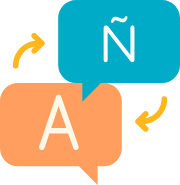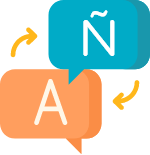Result for Immigrant rights
Language access plan template This Language access template is designed to help your program create or enhance your language access plan. The template includes sample language that is relevant for working with survivors with limited English proficiency. The template is offered as a PDF document that is editable with Adobe Acrobat, […]
Direct advocacy tools Language identification cards and posters Minnesota Department of Human Services: This is a fairly comprehensive list of resources for Limited English Proficient individuals, including language interpreter cards, interpreter posters and other tools. City of Philadelphia: language access cards in 11 languages for access to services in the City […]
Community language assessment Which languages are spoken in our community? Identify the most commonly spoken languages in the area that you serve in order to help define your plan to meet those language needs. One comprehensive and easy to use resource is the mapping tool from The Civil Rights Division that […]
Community language assessment Which languages are spoken by those who come to our program? Identify the top 3 to 5 languages (other than English) spoken by participants who come to your program. Although they may be the same languages from Step 1, don’t assume that to be the case. If the […]
Management tools Building greater capacity to provide language access is an ongoing process. These tools can help you develop strategies to integrate language access into the daily operations of your program. Points of contact worksheet This Points of contact worksheet is pdf document that you can utilize as a tool for […]
Tools Advocates play an important role in creating greater access for individuals with LEP to other community systems and resources. This work is critical because it decreases barriers for the individuals that you work with, makes approaching the same resource easier the next time, and decreases barriers for others in similar […]
Translated written material It is important that vital documents are translated into the languages commonly spoken throughout your community. Translated materials already exist on many websites and can be downloaded and used in your area (some may require the addition of local service information). For example, this site contains a large […]
Interpreters Bilingual, bicultural advocacy is the best way to accomplish accurate, timely communication with survivors of domestic and sexual violence. When bilingual advocates are not available, professional, culturally competent interpreters are critical to ensuring equal access to safety. It is never recommended to use friends, family members or other survivors as […]
Bicultural and bilingual staff A staff that reflects the languages and cultures in your community is best positioned to provide all survivors with meaningful access to your advocacy services. Bilingual advocates can speak directly and unambiguously to survivors, determine if they are safe, inform them of services available, and assess whether […]
Identifying spoken language Languages that you have never heard before might be hard to identify—an important first step in finding an interpreter! There are a few strategies to try. Language identification cards & posters If you are working in person with a survivor who is unable to tell you the English […]









